GCL Day 3: Four teams share the lead after Triveni and Mumba lose
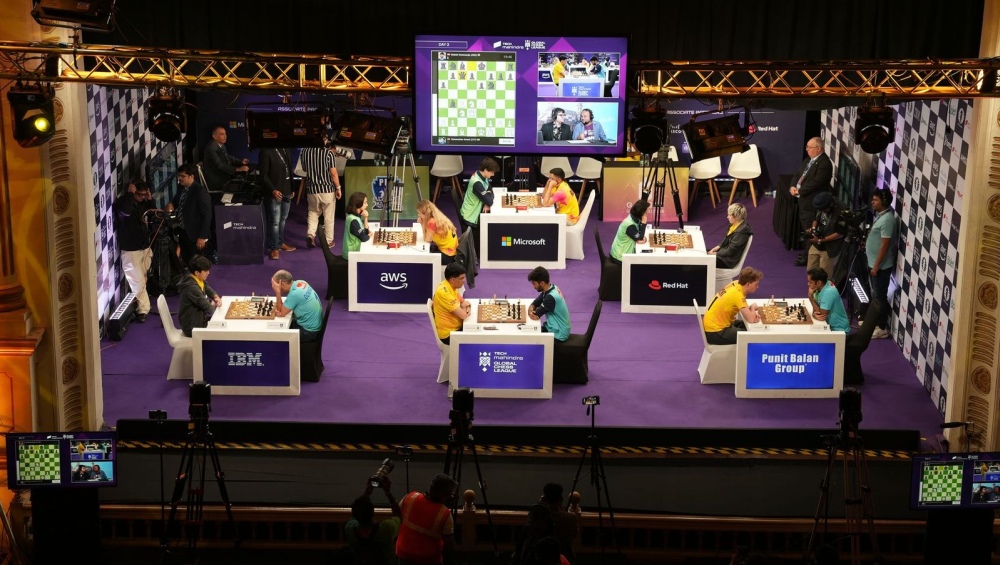
After three days of play at the Global Chess League, no team remains undefeated. The third day of the Tech Mahindra Global Chess League brought big changes. Both previously unbeaten squads, Triveni Continental Kings and upGrad Mumbai Masters, suffered their first losses. Fyers American Gambits edged Triveni 10 to 8 in a tense clash decided on the prodigy board, while Alpine SG Pipers finally broke through with a 9 to 7 victory over upGrad, their first win of the season. Earlier, Ganges Grandmasters opened the day by sweeping past PBG Alaskan Knights 12 to 3, with Viswanathan Anand scoring his first win in Mumbai against World Champion Gukesh. After three rounds, the standings have tightened completely. Four teams now share the lead on six Match Points each: Triveni Continental Kings, upGrad Mumbai Masters, Ganges Grandmasters and Fyers American Gambits. upGrad hold a narrow edge on Game Points (on 33), just ahead of the defending champions Triveni (on 32), with Ganges (on 29) and the Gambits (on 25) close behind. Standings after Day 3 Alpine SG Pipers are now back in contention with three Match Points following their late win over upGrad. PBG Alaskan Knights remain at the bottom of the table, still looking for their first match victory. Match 7: Ganges Grandmasters vs PBG Alaskan Knights (12:3) The third day of Season three opened with two teams moving in opposite directions. Ganges Grandmasters had just found their form with a 13 to 7 win over Alpine SG Pipers on day two, after a very tough start against upGrad Mumba Masters. PBG Alaskan Knights came in still shaken by their 3 to 15 loss to Triveni Continental Kings. They were also still without a match victory after a narrow defeat to Fyers American Gambits on day one. From the outset, it was clear that Ganges had carried their momentum into this round. Across the boards, they were the ones pressing, while the Knights struggled to find their footing. A heavy loss for PBG soon seemed a real possibility. The first result, however, was peaceful: on the prodigy board, Daniel Dardha and Raunak Sadhwani repeated moves and agreed a draw. After their dramatic earlier games in the league, this time neither side took full risk and the match began with one Game Point each. The first breakthrough came from Javokhir Sindarov. Facing Leinier Dominguez, accepted a pawn sacrifice for which Black got more than sufficient compensation. However, a serious mistake on move 25 by Leinier cost him dearly – White managed to neutralize all his threats and liquidated into an endgame with an extra pawn and more active pieces. Dominguez fought on and played on for some time, but there was no real hope. Ganges took the 4 to 1 lead in Game Points. On the Icon board, the spotlight fell on the all-Indian meeting of two World Champions – former and current. Viswanathan Anand had lost both his games so far in Mumbai and needed a result. Playing with White against Gukesh in a Sicilian, Anand seized space and gradually built up initiative, keeping Black under constant pressure. He eventually broke on the queenside and promoted his c-pawn, creating deadly threats to Black’s king. Gukesh had to resign. On the second men’s board, Arjun Erigaisi faced Vincent Keymer. Under pressure for much of the game, Arjun defended accurately and steered the position to a draw. Ganges then struck again on the women’s board. Polina Shuvalova, fresh off her Day 2 win over Hou Yifan, defeated over Kateryna Lagno in a very complex game riddled with mutual mistakes. Polina eventually emerged from complications with an extra piece, and the rest was a smooth sailing. Another three Game Points went to Ganges, stretching the lead to 10 to 1. The last hope for PBG lay on the remaining women’s board. Sara Khadem outplayed Stavroula Tsolakidou and reached a better endgame. Tsolakidou made several mistakes in mutual time trouble, but Khadem did not manage to find the most precise continuations. The advantage slipped away, and the game simplified to a drawn position. Another half point each went on the scoreboard. When the dust settled, the final score was 12 to 3 in Game Points for Ganges Grandmasters. With three wins and no losses in this match, they continued their strong recovery. PBG Alaskan Knights, on the other hand, suffered their second heavy defeat in a row and remain under pressure to turn their season around. Match 8: Triveni Continental Kings vs Fyers American Gambits (8:10) The day’s second match pitted the defending champions against one of the most dangerous challengers. Triveni Continental Kings had started the season with two wins: they beat Alpine SG Pipers by 9-7 on and then crushed PBG Alaskan Knights by 15-3. Fyers American Gambits arrived on three Match Points from two rounds. They had defeated PBG Alaskan Knights on the opening night, then narrowly lost to upGrad Mumba Masters. Both teams fielded their strongest lineups. For Triveni this meant Alireza Firouzja, Wei Yi, Vidit Gujrathi, Zhu Jiner, Alexandra Kosteniuk and Marc’Andria Maurizzi. For the Gambits it was Hikaru Nakamura, Richard Rapport, Vladislav Artemiev, Bibisara Assaubayeva, Teodora Injac and Volodar Murzin. The first decisive result came on one of the men’s boards. Richard Rapport played a fine positional game against Vidit Gujrathi. Step by step, he restricted White’s pieces and built a kind of geometric cage around the white king. Vidit spent a long time searching for a defence but there was no way out. The Gambits took the first win of the match and four Game Points. Triveni struck back spectacularly on a women’s board. In a very sharp Scotch, Alexandra Kosteniuk emerged with two minor pieces against Teodora Injac’s rook and a pawn. The position remained balanced for a long time, but in Injac misplayed walking her king into a mating net. Kosteniuk finished the game by checkmating with a pawn – a rare sight in top level chess. Her win brought three Game Points and leveled
FIDE World Senior Team Championships 2026: Registration now open

FIDE and the Albanian Chess Federation invite all FIDE member federations and eligible teams to participate in the World Senior Team Chess Championships taking place in Durres, Albania, from April 18 (arrival) to April 29 (departure), 2026. The championships are open to all players, regardless of rating or title, who have reached or will reach the required age during the calendar year of the competition. National federations shall register their teams in accordance with the official regulations. The event will feature four: age 50+ and age 65+, Open and Women, with separate events for women with a minimum of 10 teams from at least 2 continents. The registration deadline is February 18, 2026. FIDE Senior Teams Championship official website (coming soon): worldseniorteam2026.fide.com Email: worldseniorteam@fide.com Registration form (DOCX) Invitation letter, regulations, and registration details (PDF)
GCL Season 3, Day 2: Mumba and Triveni in the lead
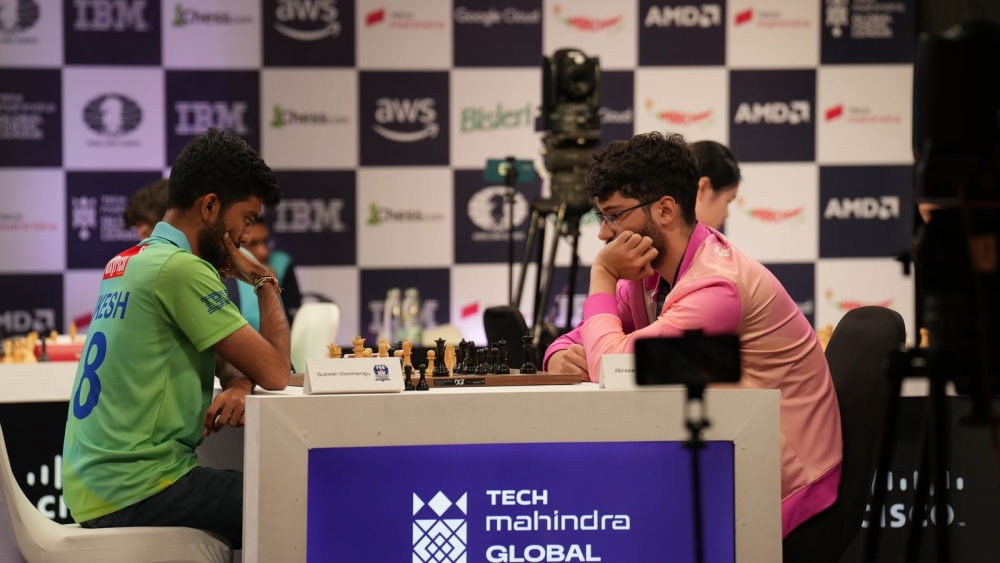
By the end of day two only two teams still had a perfect record. Triveni Continental Kings crushed PBG Alaskan Knights by 15 to 3 in Game Points. The day started with three teams on full Match Points from day one: Triveni, upGrad and Fyers. Trailing them, Alpine, Ganges and PBG were under pressure to respond. Once again the Royal Opera House in Mumbai saw hard fought games, deep time trouble and tense finishes on every board. upGrad Mumba Masters narrowly beat Fyers American Gambits by 9 to 7. Ganges Grandmasters scored their first victory of the season with a 13 to 7 win over Alpine SG Pipers. Fyers stayed on three Match Points. Alpine and PBG are still seeking their first match win. Standings after Day 2 Match 4: Fyers American Gambits vs upGrad Mumba Masters (7:9) The opening match of the day was a clash between two teams who had both started with wins. The Gambits had edged out PBG Alaskan Knights 8–5 in Game Points on Day 1 thanks to Teodora Injac’s lone victory, while the upGrad Mumbai Masters had been the most impressive team of the opening night, crushing the Ganges Grandmasters 17–4 in Game Points. After the traditional coin toss, the Fyers American Gambits chose to play with the White pieces. The match began quietly, with most positions balanced. The first game to finish was on the second Superstar board, where Wesley So and Vladislav Artemiev followed a well-known line in the Italian Game. With the position equal and both aware of the team stakes, they agreed to a draw. Then came the first big blow for the Gambits. On the first Superstar board, Shakhriyar Mamedyarov outplayed Richard Rapport in a complicated middlegame. Rapport is often the player who brings more surprise and creativity, but this time Mamedyarov took over that role, steering the game into a winning endgame and smoothly converting his advantage. upGrad scored an important three Game Points. Hikaru Nakamura immediately looked at the screens to assess the situation. Seeing Rapport’s loss, he knew he had to play for a win. Doing so with Black against Maxime Vachier-Lagrave is one of the hardest tasks in the league, but the match situation left him no choice. More bad news followed for the Gambits. On the prodigy board, World Rapid Champion Volodar Murzin was outplayed by Daneshvar Bardiya. In a Ruy Lopez, Murzin went wrong early and had to defend an inferior position for most of the game. Daneshvar kept everything under control and scored the full point. With two victories and a draw, upGrad were close to securing the match. This increased the pressure on Nakamura, who was pressing Vachier-Lagrave in a tense endgame. Under heavy time pressure, Maxime made a fatal error in an otherwise even position. Nakamura immediately jumped on the opportunity, won an exchange, and the rest was an easy ride. A win with Black brought the Gambits back into the match, with the Game Points score now standing at 7–5 for upGrad. The final word came from the women’s boards. Bibisara Assaubayeva obtained a slightly better position against Humpy Koneru but could not make progress; Koneru defended accurately, and the game ended in a draw. On the other women’s board, Harika Dronavalli pressed Teodora Injac for most of the game, but Injac put up stubborn defense and was rewarded with a half-point. When the last handshake was made, the numbers told a very narrow story. The upGrad Mumbai Masters won the match 9–7 in Game Points and collected another three Match Points. After two days, they remain on a perfect score, building on their dominant start against Ganges. The Fyers American Gambits stayed on three Match Points from two matches. Match 5: Alpine SG Pipers vs Ganges Grandmasters (7:13) Both teams came into match five under pressure. On Day 1, the Alpine SG Pipers had lost narrowly to the defending champions, Triveni Continental Kings, 9–7 in Game Points, while the Ganges Grandmasters had suffered the heaviest defeat of the day, losing 17–4 to the upGrad Mumbai Masters. Both sides desperately needed a strong result. The first breakthrough came on the Superstar board. Alpine’s Anish Giri emerged better from an English Opening against Vincent Keymer, then launched a direct attack on the black king, even offering a knight that was too dangerous for Keymer to capture. Giri reached a winning position, but his clock became his biggest problem. With seconds ticking away and Keymer defending resourcefully, the German grandmaster fought back to equality. Given the match situation and his time trouble, Giri accepted a draw by threefold repetition. On the Icon board, Viswanathan Anand faced Fabiano Caruana. Both had lost their Icon games on Day 1 and were looking to respond. In a level position, Anand played a natural-looking move that turned out to be a serious mistake. Caruana seized the chance, took over the initiative, and never let go. Soon, Black’s position was beyond repair, and Anand had to resign, giving Alpine their first win of the match. The mood in the Mumbai Opera House shifted, with many in the crowd stunned to see Anand facing a second straight loss. Ganges retaliated on the prodigy board. Raunak Sadhwani, who had blundered a piece and lost quickly on Day 1, produced a clean performance against Leon Luke Mendonca. Playing with Black, he equalised first, then gradually outplayed his opponent and converted his advantage. It was an important four-point win and a personal redemption for Sadhwani. Almost simultaneously, on the women’s board, Polina Shuvalova was conducting a powerful attack against Hou Yifan. The world’s top-rated woman player and former Women’s World Champion could not fend it off and capitulated, facing imminent checkmate. Ganges added another four Game Points. Alpine struck back through Nino Batsiashvili. Fresh from her win on Day 1 against Alexandra Kosteniuk, she defeated Stavroula Tsolakidou in a Benko Gambit. This kept the Pipers within reach and confirmed Batsiashvili as one of their early-season leaders. With the score
Top 10 women players fighting for the crown in Doha

Women’s chess, like the Open, has its own cycles, storylines and stars. Doha will bring many of them together under one roof. Over the past few years, FIDE has pushed women’s chess up the agenda. The International Chess Federation declared 2022 the Year of the Woman in Chess and backed it with programs for girls, coaches and officials, as well as gender quotas in some official roles. The Commission for Women’s Chess now openly speaks of a “surge in the interest of women in chess” and sets its mission to make the game “beloved and accessible” to women worldwide. Still, there is a prevailing view in the wider chess community that more needs to be done to get women and girls playing chess. Women constitute only around 11 percent of FIDE members, according to a 2024 research paper on gender and chess. Yet the direction is clear: More national federations are fielding women’s teams. Ahead of the 45th Olympiad in Budapest, nine countries prepared female teams for the first time, helped by a dedicated FIDE project. Also for the first time in the Chess Olympiad, players who have small children were given support to bring over their children and a guardian, so they would not have to be separated during the long event. Prize funds are rising as well. The World Rapid and Blitz in Doha has a total purse of one million euros, with three hundred thousand reserved for the women’s events, split between rapid and blitz. The Women’s Grand Prix series has seen its overall prise fund jump from eighty thousand to one hundred twenty thousand euros, and the top prizes per tournament also increased. Some top events, such as Norway Chess, now run women’s super-tournaments with the same prize money as the open. Off the board, more women are visible as content creators and public figures. Rankings of “female chess influencers” already list several dozen active streamers and social media personalities. Players such as Anna Cramling or the Botez sisters show that a chess career today is not just about competition, but also about commentary and full-time streaming in front of global audiences. A 2024 survey of elite women players found that 65 percent believe a woman will one day win the overall world title, many expecting it within the next decade. In this wider shift, the women arriving in Doha for the World Rapid and Blitz form the top edge of the pyramid. The ten highest-rated players in the women’s field combine world title experience, blitz genius, and a mix of established champions and younger stars. These are the leaders of women’s fast chess in Doha. Ju Wenjun – the benchmark Photo: Anna Shtourman Top seed Ju Wenjun, with a rapid rating of 2530 on the entry list, comes to Doha as the player everyone else measures themselves against. In April she defended her Women’s World Championship title for the fifth time, beating Tan Zhongyi 6.5–2.5 in a match played in Shanghai and Chongqing. Earlier, she had already dominated the World Rapid and Blitz in New York. Ju won the 2024 Women’s World Blitz Championship, beating Lei Tingjie in an overtime final, and shared second to seventh place in the Women’s Rapid. She is not just a classical specialist. Ju is a complete all-around champion who handles every time control with calm and precision. In Doha, she is the natural favourite, but also the main target. Tan Zhongyi – fighter in every format Photo: Michal Walusza Tan Zhongyi, second seed on 2507 and a former Women’s World Champion, has been locked in a rivalry with Ju for almost a decade. She earned her second world championship match by winning the 2024 Women’s Candidates Tournament with nine points from 14 games, finishing one and a half points ahead of the field. While she could not stop Ju in the 2025 title match, Tan scored the first win before the champion pulled away. In tournaments, Tan stays near the top in both classical and rapid. At the 2025 Women’s World Cup, she again reached the latter stages but was eliminated in the semifinals by the eventual winner IM Divya Deshmukh. Tan’s approach is practical and determined. She defends tough positions for hours and is equally ready to attack if a chance appears. In rapid and blitz, that ability to hold bad positions and keep the game going can be worth as much as sharp preparation. Aleksandra Goryachkina – Grand Prix leader and rapid star Photo: Michal Walusza Aleksandra Goryachkina is another well-known face in women’s chess. Rated 2505, she is one of the strongest women players, a former world championship challenger and often a participant of Open rather than Women’s competition. Her recent performances have been strong. In 2024, she won the Tata Steel Chess India Rapid women’s event in Kolkata, scoring 7/9, staying undefeated and finishing a point and a half ahead of her nearest rival. In the same season, she took first place at the Shymkent leg of the FIDE Women’s Grand Prix, then followed it in February 2025 with victory in Monaco, again winning a three-way tie on tiebreak. Wins in Shymkent and Monaco secured her second-place finish in the overall Grand Prix standings (behind Zhu Jiner) and earn a spot in the next Candidates Tournament. Still, at the 2025 Women’s World Cup, she had a rough time and was eliminated early by Meruert Kamalidenova. In fast chess, Goryachkina is known for her excellent positional understanding and endgame technique. A camera-shy player, Goryachkina prefers to let the moves on the chessboard speak for her. Lei Tingjie – silver in New York, always in contention Photo: Anna Shtourman Lei Tingjie, seeded fourth on 2496, has been near the summit of women’s chess since her run to the 2023 world championship match against Ju Wenjun, which she lost by the narrowest of margins, 5.5 – 6.5. Last December, in New York, she reached the final of the 2024 Women’s World Blitz Championship and only lost to
Checkmate Grants: Unlocking Funding Opportunities – Seminar announced by FIDE Infinite Chess
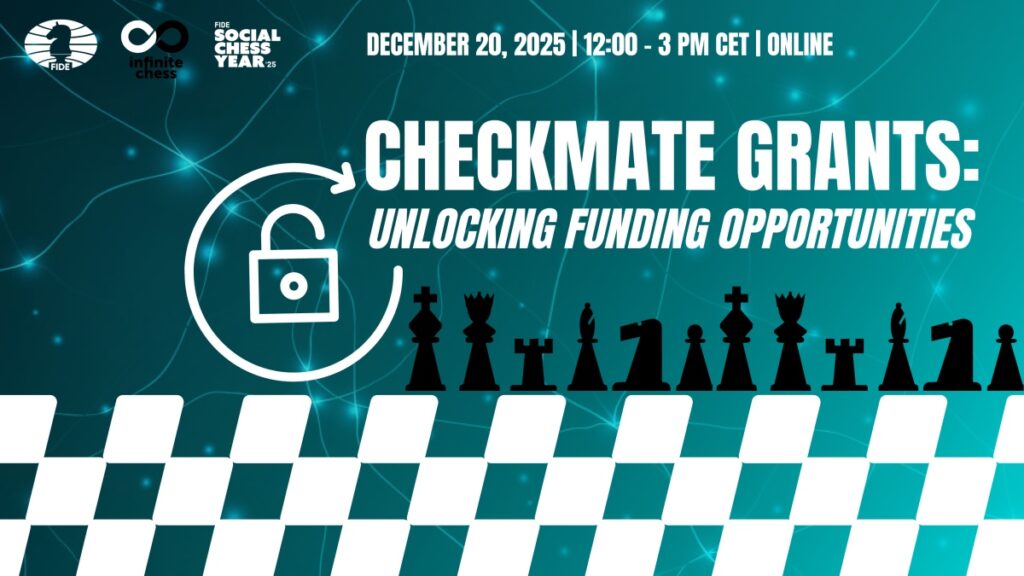
FIDE Infinite Chess is pleased to announce an online seminar, “Checkmate Grants: Unlocking Funding Opportunities” (Friday, December 20, 2025 | 12:00–15:00 CET). This event is designed for social project leaders, chess educators, NGO representatives, and anyone interested in driving social impact through chess. This three-hour session will equip participants with the knowledge and confidence needed to identify, approach, and secure funding for chess-based social initiatives. Speakers will include experienced project leaders who have successfully obtained European and Spanish national grants, as well as representatives from major companies that support social-impact programmes. Attendees will learn how to: Craft compelling proposals Build meaningful partnerships Understand the criteria funders use when selecting projects Real-life case studies of funded initiatives will provide practical insights and inspiration. Key Takeaways: How to identify potential funders for social chess projects Practical tips for preparing strong grant applications What funders look for in impactful proposals Case studies of successful chess-related social projects Registration: https://forms.gle/ez8MrkEUUVK8ex8NA Join us to discover new opportunities and empower your chess initiatives through sustainable funding. About FIDE Infinite ChessThe FIDE Infinite Chess Program is a global initiative that aims to make chess accessible and inclusive for individuals with neurodiverse conditions such as autism, ADHD, Down syndrome, and other developmental challenges. Its philosophy is that chess is more than a game; it’s a universal language of logic, focus, and connection that can be adapted for every learner. Through sensory-friendly environments, adaptive teaching, and compassion-centered mentorship, Infinite Chess nurtures both cognitive and social-emotional skills, helping children build abilities for life beyond the board. With the support of the FIDE Planning and Development Commission (PDC), the International Olympic Committee (IOC), and the Kindness on Board Foundation, the FIDE Infinite Chess project is now active in 28 countries, serving over 270 children with autism and co-occurring conditions. The project operates in stages from January/February to May and from September to November/December, with a break during the summer. During Stage 7 (January/February–May 2025), chess lessons were held in 25 countries. AcknowledgementsWe wish to extend our profound appreciation to the dedicated team behind the groundbreaking FIDE Infinite Chess project. Their vision, hard work, and collaborative spirit have been instrumental in bringing this ambitious initiative to life. Our special gratitude goes to: Dana Reizniece, Project Supervisor and Deputy Chair of the FIDE Management Board, for her strategic oversight and unwavering support, which provided the essential foundation for the project’s success. Anastasia Sorokina, Project Leader and Chair of the FIDE Women’s Commission (WOM), for her dynamic leadership and passionate commitment, which steered the project from concept to reality. Maria Tamkovich, Project Coordinator, for her meticulous coordination and tireless efforts in managing countless operational details. Finally, our gratitude extends to every member of the FIDE Infinite Chess family. The support, cooperation, and shared belief from this entire community have been invaluable. This achievement is a testament to what we can accomplish together. Infinite Chess official website: infinitechess.fide.com/
FIDE General Assembly decisions regarding Russia and Belarus
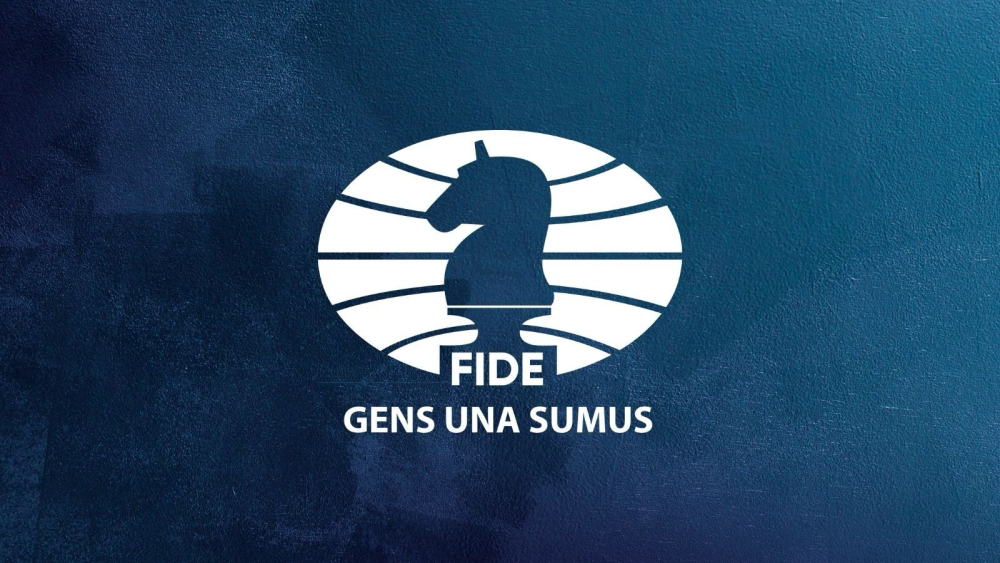
FIDE General Assembly mandates the return of all teams and fully restores the rights of youth players in line with IOC recommendations; FIDE Council to finalise protocols for adult teams following IOC consultation. During the FIDE General Assembly held online on 14 December, national delegates voted on two separate resolutions regarding the status of Russian and Belarusian chess players. The first resolution was filed by the Russian Chess Federation, while the second resolution was proposed by the FIDE Council. Both resolutions referenced recent decisions and recommendations by the International Olympic Committee regarding players from Russia and Belarus. The FIDE Council resolution also referenced the recent Olympic Summit decision, based on the IOC EB recommendation, noting that “youth athletes with a Russian or Belarusian passport should no longer be restricted in their access to international youth competitions, in both individual and team sports… In addition, the standard protocols of the IF or the International Sports Event Organiser regarding flags, anthems, uniforms and other elements should apply, provided that the national sports organisation concerned is in good standing. The above principles should apply to the Dakar 2026 Youth Olympic Games, and are recommended for adoption by all IFs and International Sports Event Organisers for their own youth events.” (see: Olympic Summit reaffirms athletes’ fundamental rights to access sport without political interference). In a procedural outcome, reflecting the diversity of views within the chess community, the General Assembly voted to adopt both the resolution proposed by the Chess Federation of Russia (61 votes in favour, 51 against, 14 abstentions and 15 delegates not voting) and the resolution proposed by the FIDE Council (69 votes in favour, 40 against, 15 abstentions and 17 delegates not voting). Following the results, delegates raised questions regarding the procedural interaction between the two adopted texts and their immediate application. Addressing these points, FIDE President Arkady Dvorkovich acknowledged that both decisions garnered the necessary majority and are valid expressions of the Assembly’s will. Consequently, the FIDE Council will proceed immediately with the points of consensus found in both resolutions, in accordance with IOC recommendations and the most recent guidance from the Olympic Summit on access to sport and political neutrality. The resolutions differ on the technical protocols regarding the use of national symbols (flags and anthems) in adult team competitions. The proposal from the Russian Chess Federation calls for the immediate restoration of national symbols. The proposal from the FIDE Council mandates the use of national symbols in youth and junior events, but currently requires neutral symbols for adult events, subject to further IOC consultation. To respect the legal validity of both votes, the FIDE Council considers the Council resolution to be in force immediately as the baseline for operations. This means that: Teams from Russia and Belarus are admitted to official FIDE tournaments. Full use of national symbols is allowed in youth and junior competitions, in line with IOC recommendations. Restrictions on holding official FIDE events in Belarus are lifted, in line with recent guidance from the Olympic Summit on access to sport and political neutrality. Regarding the specific divergence on symbols in adult events, the Council will execute the mandate included in the Council resolution to consult with the International Olympic Committee (IOC). The Council will make a final determination on the use of flags and anthems in adult team events following these consultations to ensure alignment with international sports standards and the IOC.
GCL 2025 Day 1: Defending Champions Triveni start season three with a victory
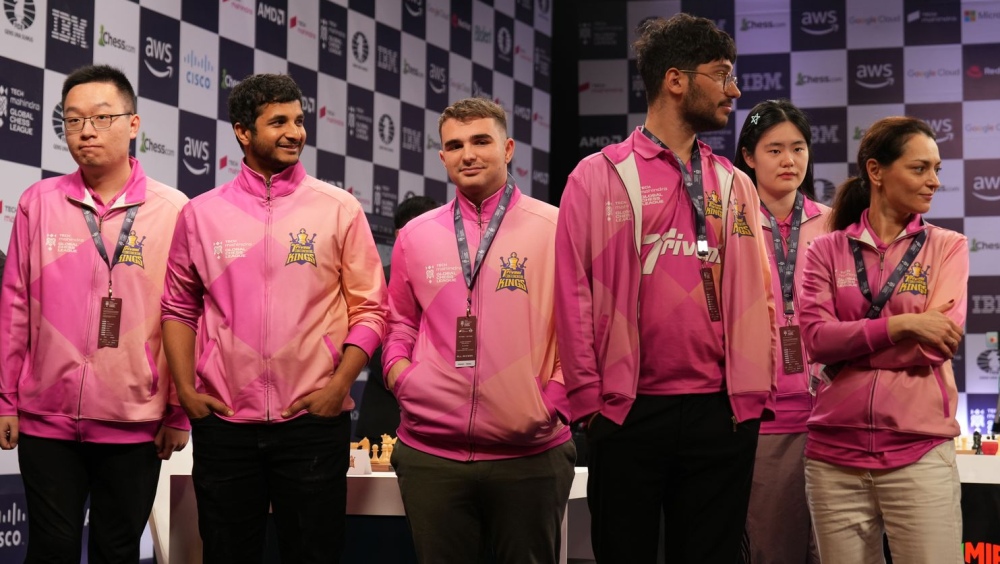
The third season of the Global Chess League began with a sold-out night at Mumbai’s Royal Opera House and three matches that set the tone for the event. The defending champions, Triveni Continental Kings, opened with a hard-fought win. The young Ganges Grandmasters suffered a heavy defeat against the home side, upGrad Mumbai Masters. In the final match, Fyers American Gambits edged out PBG Alaskan Knights in a tense encounter decided by a single decisive game. There were no easy points. Across the three matches, only a handful of games produced decisive results, and almost every board went deep into time trouble. The champions demonstrated their class, the underdogs showed they could hurt anyone, and by the end of the night, three teams had emerged with perfect match scores, with the race already taking shape. Standings after Day 1 Match 1. Triveni Continental Kings vs Alpine SG Pipers (9-7) Season three of the Global Chess League opened with a heavyweight clash between the defending champions, Triveni Continental Kings, and the Alpine SG Pipers at Mumbai’s Royal Opera House. The Kings came in as clear favorites, having won both previous seasons, and again fielded a star-packed team. Under the guidance of captain Loek van Wely, they lined up Alireza Firouzja, Wei Yi, Vidit Gujrathi, Alexandra Kosteniuk, Zhu Jiner, and GCL debutant Marc’Andria Maurizzi. About half an hour after the start, the evaluation bars pointed in Triveni’s favor. Wei Yi achieved a promising position on board two, while the remaining games were balanced. Then the mood changed. On the women’s board, Alexandra Kosteniuk fell into serious time trouble against Nino Batsiashvili. She was down to two minutes while Batsiashvili had around eight, and Kosteniuk’s position began to collapse. Batsiashvili converted, giving Alpine SG Pipers the first win of the match and the new season. Triveni struck back immediately on board one. Fabiano Caruana made a major mistake in a promising position, allowing Firouzja to sacrifice two pieces for a devastating attack. Alireza’s win leveled the score and restored momentum for the champions. Wei Yi then increased the pressure in his game against Anish Giri. Pushed back, the Dutch grandmaster kept playing, trying to create counter-chances, but Wei Yi maintained his concentration and finished the job, putting the Kings ahead on the top men’s boards. In the Indian derby, Vidit Gujrathi and R Praggnanandhaa played a tense game that ended in a draw. The women’s game between Zhu Jiner and Hou Yifan was also complex, but neither side managed to break through, resulting in another draw. The last game to finish was on the prodigy board, where Marc’Andria Maurizzi had a slight edge against Leon Luke Mendonca. Once he realized a draw would be enough for a team victory, he chose a safe path. The position simplified, and the opponents split the point. On the scoreboard, Triveni Continental Kings won the match 3.5–2.5. With three points for a win with White, four for a win with Black, and one point for a draw, this translated to nine game points for Triveni and seven for Alpine SG Pipers. The champions started their title defense with three match points. Match 2. Ganges Grandmasters vs upGrad Mumbai Masters (4-17) The second match of Day 1 presented a clear contrast in styles. The young Ganges Grandmasters faced the experienced upGrad Mumbai Masters, who enjoyed home-crowd support in Mumbai. upGrad started with all Black pieces but showed they were ready to fight on every board. For the first half hour, the match was roughly balanced, but the first serious problems appeared for Ganges on the Icon board. Viswanathan Anand, with White, was under heavy pressure from Maxime Vachier-Lagrave. At the same time, Ganges had reason for optimism, as Vincent Keymer took the initiative against Wesley So on board two and looked ready to press. Then came a turning point that hurt Ganges badly. On the prodigy board, Raunak Sadhwani blundered a piece in an equal position. The mistake was so significant that he resigned immediately. upGrad took four game points and an early lead. Ganges still had chances on the remaining boards. Polina Shuvalova was better against Humpy Koneru, while Javokhir Sindarov, fresh from his World Cup victory in Goa, outplayed Shakhriyar Mamedyarov and reached a very promising position. For a moment, it looked as if the young team might turn the match around. Instead, upGrad struck again. The second game to finish was on the top board, where Anand had to resign against Vachier-Lagrave. Another four game points went to the Mumbai side, pushing Ganges closer to a must-win situation on the remaining boards. That put extra weight on Keymer’s shoulders. He had a superior position against So and knew the team needed a victory. In time trouble, Vincent had more time than his opponent, but a rushed bishop sacrifice changed the balance. So defended accurately, escaped the danger, saved the game, and preserved upGrad’s large lead. Ganges finally scored when Shuvalova converted her advantage against Humpy Koneru, earning three game points and putting her team on the scoreboard. The match stood at four game points for Ganges against nine for upGrad, with two games still in progress. Both remaining games descended into wild time scrambles. On one women’s board, Stavroula Tsolakidou outlasted Harika Dronavalli in a nervous final phase to score the second win for Ganges. On the other side, Mamedyarov turned the tables against Sindarov and took the full point, extinguishing any hope of a comeback. The games were often close on the board, but the overall numbers told a different story. The final score was 4.5–1.5 in favor of upGrad Mumbai Masters, who took three match points. In game points, upGrad scored 17, while Ganges Grandmasters finished with four. The experienced home team started their campaign with a convincing victory. Match 3. PBG Alaskan Knights vs Fyers American Gambits (8-5) The opening night of the Global Chess League ended with a duel between the PBG Alaskan Knights, led by World Champion Gukesh D,
Turkish Championship 2025: Işık Can captures maiden title
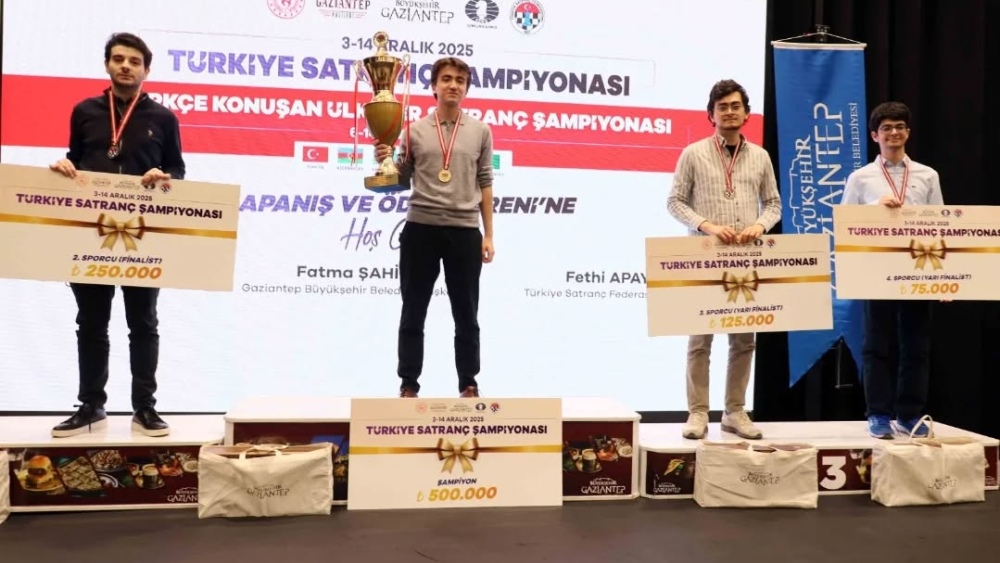
GM Işık Can has emerged as the winner of the 2025 Turkish Championship, claiming his first national title. The 60th Turkish Chess Championship, organized by the Turkish Chess Federation and hosted and supported by Gaziantep Metropolitan Municipality, was held at the Müzeyyen Erkul Science Center in Gaziantep from December 3–14. The competition followed last year’s format: ten players who qualified via a preliminary round were joined by six top seeds – GMs Mustafa Yılmaz (2594), defending champion Vahap Şanal (2546), Işık Can (2527), Cem Kaan Gökerkan (2502), and IMs Arda Çamlar (2490) and Alparslan Işık (2464) – in a 16-player knockout bracket. The rating favorite cruised to the quarterfinals, which produced the first major upset when top seed Mustafa Yılmaz was eliminated by qualifier Kerem Erten. Erten advanced to the semifinals alongside Şanal, Can, and Gökerkan. The Şanal–Can semifinal was an exciting clash in which the lower-rated player showed his mettle. In the first game, Can achieved a winning position with White in a Scotch Opening but let his advantage slip away. After a series of mutual mistakes, the opponents split the point. In the second game, Can again emerged with a better position but opted for a tempting piece sacrifice, leading to a roughly equal yet unbalanced endgame. Still Şanal faced some problems with potential Black’s pawn-chain advance in the center. The 2024 Turkish champion made a couple of subpar moves and found himself in a tough position. Can offered him a lifeline at one point, but Şanal immediately committed a grave mistake that cost him the game – and a spot in the final. In the second semifinal, Cem Kaan Gökerkan prevailed over Kerem Erten in a rapid tiebreaker to advance to the final. The final was dominated by Işık Can, who won both classical games to claim the championship title outright. In the match for third place, Vahap Şanal outplayed Kerem Erten to secure the bronze medal. Official website: tr2025.tsf.org.tr/ Photos: official website
Global Chess League opens Season 3 at Mumbai’s Royal Opera House

The first franchise-based chess league in the world – GCL – has entered its third season with a grand opening ceremony at the historic Royal Opera House in Mumbai. Is chess art, sport or entertainment? The game, long seen as an individual competition played in silence behind closed doors, is undergoing a transformative change both on and off the board. The Global Chess League – a bold attempt by TechMahidnra and FIDE to make chess into a billion-dollar fan-based league sport – is driving the charge. Capitalising on India’s rise as a global chess powerhouse, the third edition of GCL takes place in the country’s financial and entertainment capital – Mumbai. A royal ceremony for the royal game The Royal Opera House in Mumbai – whose foundations were laid in 1909 – is a unique architectural jewel in Asia, regarded as India’s only remaining traditional opera theater. With extravagant interiors mixing baroque and Indo-European influences, its auditorium ceiling provides an ideal acoustic reception from every part of the building. After opera performances, live music and film projections, the Royal Opera House will for the first time be the venue of a global chess event. The opening ceremony included the unveiling of the GCL Season 3 trophy. The ceremony was led by Anand Mahindra, Chairperson of the Mahindra Group, whose presence underlined the league’s ambition and growing global stature. He was joined by chess legends Viswanathan Anand, Arjun Erigaisi, Praggnanandhaa R, Harika Dronavalli, Volodar Murzin, and Alireza Firouzja. A trophy with a story The trophy itself tells part of the story of what GCL wants to be. Designed by Pininfarina, the 95-year-old Italian firm that helped shape Ferrari, Alfa Romeo and Maserati, it brings the language of fast cars and industrial design into the world of chess. Sharp, rising lines and polished metal give a sense of speed and movement. It is a fitting symbol for a rapid league that wants to grow quickly and speak to a wider public. For the next ten days, every move played in Mumbai will be made with that silver shape in mind. GCL as part of FIDE’s strategic effort For the International Chess Federation, the Global Chess League fits into a wider effort to bring chess to new audiences. FIDE President Arkady Dvorkovich did not hide his support for the project. “The Global Chess League has firmly established itself as one of the premier destinations for chess, bringing elite competition to a global audience in a fresh, modern, and exciting format. The GCL has an important role in FIDE’s strategic effort to popularize the sport and make it more attractive to the broader audience. I am certain that Season 3 will continue this evolution, showcasing the world’s best players and reinforcing FIDE’s commitment to making top-level chess more engaging, inclusive, and globally accessible.” The competition and the concept Season three keeps the basic structure that made the Global Chess League stand out from the start. Six franchises will compete across 34 matches, played over ten high-intensity days in a double round-robin, followed by a third-place playoff and the Grand Finale on 23 December. Every encounter is a six-board clash with a fixed mix of men, women and prodigies. Season 3 continues to feature six teams and bring the world’s elite onto a single stage. Among the big names headlining the season are Alireza Firouzja, Fabiano Caruana, Hikaru Nakamura, Wesley So, Maxime Vachier-Lagrave, Hou Yifan, Zhu Jiner, Bibisara Assaubayeva, and Alexandra Kosteniuk, alongside India’s finest, headlined by the former world champion and first Indian GM Vishwanathan Anand. Reigning two-time champions Triveni Continental Kings, led by Alireza Firouzja, Vidit Gujrathi, and Zhu Jiner, return with their sights set on an unprecedented hat-trick. Speaking at the pre-tournament press conference, Akash Premsen, CEO, Triveni Sports and Team Manager Triveni Continental Kings, said, “Coming in as two-time champions is a privilege, but it also raises expectations. The field is stronger than ever, and every match will demand precision. Our squad is experienced, balanced, and hungry, and we’re fully committed to defending the title with the same discipline that has defined our journey so far.” Kailash Kandpal, CEO, Ganges Grandmasters, framed his team’s approach in simple terms. “We’ve built our Season three squad around a solid core. The league continues to raise the competitive bar, and our focus is on consistency, teamwork, and delivering high-quality chess across all ten group-stage matches.” For PBG Alaskan Knights, World Champion Gukesh D and Arjun Erigaisi form a powerful spine. Team owner Punit Balan said, “With Gukesh and Arjun spearheading our lineup, competing in India adds a special layer of energy and expectation. Both are world-class talents, and the atmosphere here elevates every move. We believe our blend of youth, experience, and momentum positions us strongly for a deep run this season.” The FYERS American Gambits (who have added “FYERS” to their name), with Hikaru Nakamura as their icon, promise an aggressive, modern style. Their co-owner and CEO, Prachura PP, put it this way. “The Global Chess League has transformed how fans experience elite chess, and being part of that evolution is a tremendous opportunity. Our roster is dynamic and versatile, and we’re excited to bring an aggressive, ambitious style of play to a league that rewards bold, modern chess.” Alpine SG Pipers, fronted by Fabiano Caruana, Praggnanadhaa R and Anish Giri with Hou Yifan leading the women’s board, and UpGrad Mumba Masters, led by Maxime Vachier-Lagrave and Wesley So, complete a lineup that is strong on every board. “The calibre of players in Season three is exceptional, and we’re proud to contribute to that standard. With a roster built for high-quality, resilient chess, our aim is to deliver consistent performances from the opening weekend through to the knockout stages,” said Rohan Gupta, owner of Alpine SG Pipers. For the home franchise, UpGrad Mumba Masters, playing in Mumbai adds extra motivation. CEO Suhail Chandhok said, “This season features one of the most competitive fields we’ve seen, with world-class talent across every board. For
Vangelis Patrelakis and Maria Tsakona crowned Greek champions
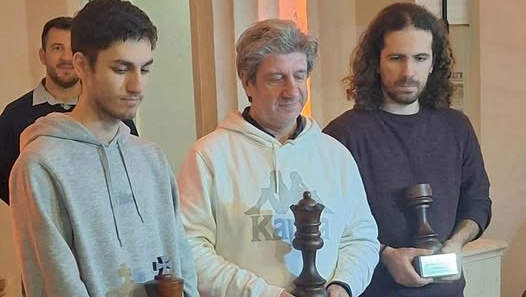
IM Vangelis Patrelakis and WFM Maria Tsakona emerged as the winners of the Panhellenic Individual Championship in the open and women’s categories, respectively, each claiming their maiden national title. The 74th Panhellenic Championship and the 47th Panhellenic Women’s Championship were held concurrently in Aigio, Western Greece, from December 3 to 11. Both events followed a 10-player round-robin format under classical time controls. The 74th Panhellenic Championship was one of the most exciting in recent years, marked by an exceptionally close contest. Notably, no player finished the tournament unbeaten, with three participants—GMs Vasilios Kotronias, defending champion Stamatis Kourkoulos-Arditis, along with IM Vangelis Patrelakis—entering the final round tied for first place on 5/9 points. Kotronias and Kourkoulos-Arditis drew their final games, while the 21-year-old Patrelakis secured a crucial victory over Konstantinos Tsarsitalidis to clinch the title. Kotronias and Kourkoulos-Arditis shared second place with 5.5/9 points, with Kotronias taking silver on the basis of a superior Sonneborn–Berger score (the third tiebreaker). Final standings – Open In the 47th Panhellenic Women’s Championship, 19-year-old WFM Maria Tsakona dominated the field, securing the title with a round to spare and an impressive score of 7.5/9. Andrianna Anastasopoulou finished two points behind the champion to earn silver, while last year’s winner, WFM Georgia Grapsa, completed the podium with 5/9 points, reaffirming her consistent presence among Greece’s top female players. Final standings – Women “This year’s Championship was a true celebration of Greek chess—high-stakes, intensely competitive, with new talents dynamically vying for their place among the country’s top players. ESO will continue to support the young generation and take initiatives to elevate chess across Greece,” said Professor Stathis Evstathopoulos, President of the Greek Chess Federation, at the closing ceremony. Photos: Greek Chess Federation

